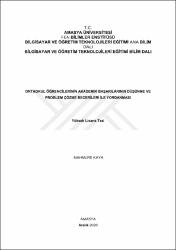Ortaokul öğrencilerinin akademik başarılarının düşünme ve problem çözme becerileri ile yordanması

View/
xmlui.dri2xhtml.METS-1.0.item-rights
info:eu-repo/semantics/openAccessDate
2021Metadata
Show full item recordAbstract
Bu araştırmanın amacı ortaokul öğrencilerinin Fen Bilgisi, Türkçe, Matematik ve Sosyal Bilgiler derslerine ilişkin dönem sonu başarı notlarından oluşan akademik başarılarının bilgisayarca düşünme, eleştirel düşünme ve problem çözme becerileri tarafından yordanma derecesini belirlemektir. Araştırmada nicel araştırma desenlerinden betimsel tarama modeli kullanılmıştır. Araştırmanın evrenini Amasya'da bulunan ortaokul öğrencileri, örneklemini ise bir ortaokulda bulunan öğrencilerden 5,6,7 ve 8. kademenin her birinden ikişer şube olmak üzere 240 öğrenci oluşturmaktadır. Araştırma kapsamında öğrencilere "Bilgisayarca Düşünme Beceri Düzeyi Ölçeği (BDBD ?=0,856)", "California Eleştirel Düşünme Eğilimi Ölçeği (The California Critical Thinking Disposition Inventory) (CCTDI ?=0,722)" ve "Çocuklar İçin Problem Çözme Envanteri (?=0,872)" olmak üzere toplam 3 adet ölçek uygulanmıştır. Öğrencilerin akademik başarı puanlarını belirlemek için ise 2019–2020 eğitim-öğretim yılı 1. Dönemde almış oldukları Türkçe, Matematik, Fen ve Teknoloji ve Sosyal Bilgiler ders notlarına e-okul sistemi üzerinden ulaşıldıktan sonra ortalamaları alınarak çalışma kapsamına dahil edilmiştir. Verilerin analizinde IBM AMOS ortamında yapısal eşitlik modeli kullanılmıştır. Yapılan analizler sonucunda ulaşılan sonuçlara göre akademik başarı ile bilgisayarca düşünme, eleştirel düşünme ve problem çözme becerileri arasında bir ilişki olduğu ve bu üç becerinin hem birbirlerini hem de akademik başarıyı pozitif ve anlamlı bir düzeyde yordadığı belirlenmiştir. The aim of this study is to determine the degree of predictive value of students' academic achievement, which consists of end-of-term success grades in Science, Turkish, Mathematics and Social Studies courses, by their computational thinking, critical thinking and problem solving skills. Descriptive survey model, one of the quantitative research designs, was used in the research. The universe of the study consists of secondary school students in Amasya, and the sample consists of 240 students, 5, 6, 7 from a secondary school and two from each of the 8th grade. Within the scope of the research, a total of 3 scales were applied to the students: "Computational Thinking Skill Level Scale (BDBD ?=0,856)", "The California Critical Thinking Disposition Inventory (CCTDI ?=0,722)" and "Problem Solving Inventory for Children (?=0,872)". In order to determine the academic achievement scores of the students, the Turkish, Mathematics, Science and Technology and Social Studies course grades they received in the first semester of the 2019-2020 academic year were obtained through the e-school system and their averages were included in the study. Structural equation modeling was used in the analysis of the data in SPSS AMOS environment. According to the information obtained as a result of the analysis, there is a relationship between academic achievement and computer thinking, critical thinking and problem solving skills, and these three skills predict each other and academic achievement at a positive and significant level.
URI
https://tez.yok.gov.tr/UlusalTezMerkezi/TezGoster?key=wf-FPgY-5qjHEzEoOgvMswFDL9aN5cV6C5l17kRFE0KT13NpiwPq_Sjof81hGATQhttps://hdl.handle.net/20.500.12450/2015
Collections
- Tez Koleksiyonu [397]

















